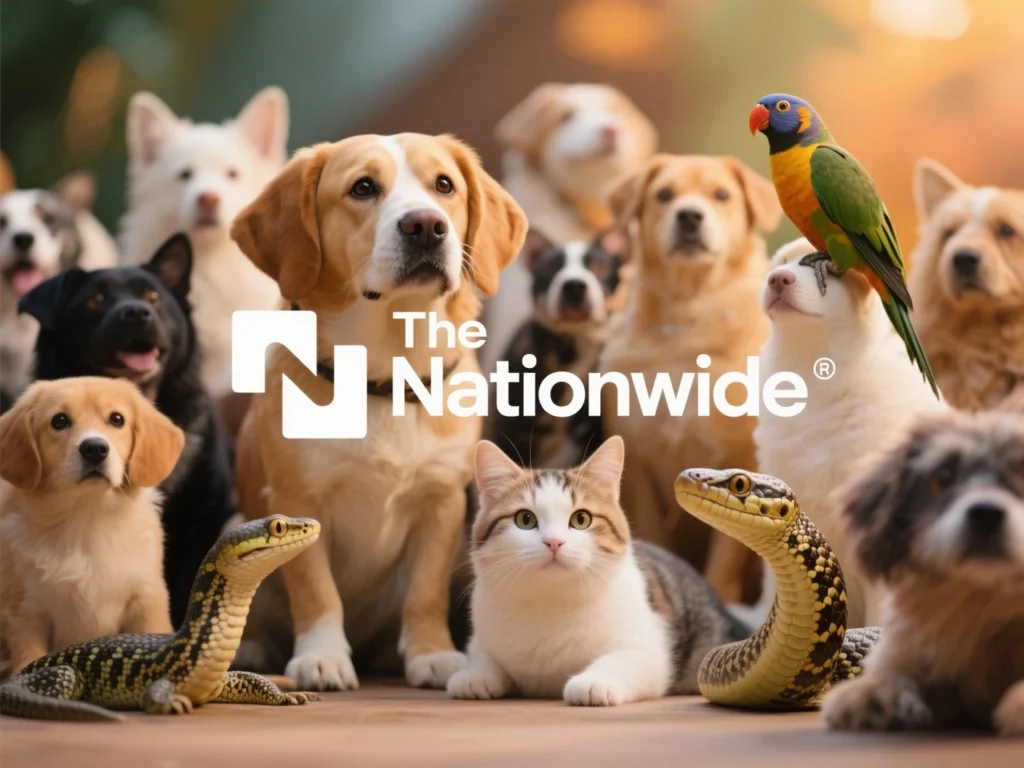Dog Insurance Secrets What to Know Before Buying are important for every pet parent. If you have a furry friend, you know they can get into all sorts of trouble.
Dog insurance can help keep you covered when those unexpected vet bills pop up.
In this article, we’ll explore key benefits of having dog insurance, tips to choose the right policy, and common mistakes to avoid.
Whether you’re a new pet owner or have had your pup for years, this guide will help you make the best choices for your dog’s health and your wallet. Let’s dive in!
Essential Insights You Should Know
- Compare different dog insurance plans, such as those outlined in our dog insurance comparison.
- Check what each plan covers and excludes.
- Look for waiting periods before coverage starts.
- Understand your premium costs and deductibles.
- Read reviews from other pet owners for better choices, including insights from Nationwide pet insurance reviews.

Summary
What is Dog Insurance and Why Do You Need It?
Dog insurance is like a safety net for your furry friend. It helps cover the costs of unexpected vet bills, whether it’s for accidents, illnesses, or even routine check-ups. Just like how we have health insurance to protect ourselves, dog insurance does the same for our pets.
But why should you consider getting it? Vet visits can get pretty pricey, especially if your dog needs surgery or treatment for a serious condition. For example, a simple surgery can cost anywhere from a few hundred to several thousand dollars. If you’re caught off guard, it can lead to tough decisions about your pet’s health. Dog insurance helps ease that burden, so you can focus on what really matters: your pup’s well-being.
Dog Insurance Secrets: What to Know Before Buying
Before jumping into the world of dog insurance, there are a few secrets you should know. First off, not all policies are created equal. Some might cover everything under the sun, while others might leave you high and dry when you need it most. It’s essential to read the fine print and understand what you’re signing up for.
Another secret? Timing is everything. The earlier you get insurance for your dog, the better. Puppies usually come with lower premiums, and getting them insured before any health issues arise can save you a lot of money in the long run. Plus, many companies have waiting periods before certain conditions are covered, so starting early is a smart move.
Lastly, consider your dog’s breed and age. Some breeds are prone to specific health issues, and older dogs might require more extensive care. This can affect your premiums and what’s covered, so keep that in mind when shopping around.
Key Benefits of Having Dog Insurance
So, what are the key benefits of having dog insurance? Let’s break it down:
- Peace of Mind: Knowing that you’re covered in case of an emergency can take a huge weight off your shoulders. You won’t have to worry about how to pay for that unexpected surgery.
- Access to Better Care: With insurance, you’re more likely to seek out the best care for your dog. You won’t hesitate to take them to the vet if you know you can afford it.
- Budgeting for Pet Care: Insurance helps you plan for your pet’s healthcare expenses. Instead of being blindsided by a huge bill, you’ll pay a manageable monthly premium.
- Preventive Care: Many policies offer coverage for routine check-ups and vaccinations. This can help you keep your dog healthy and catch any issues early on.
- Customizable Plans: There are plenty of options out there, meaning you can find a plan that fits your needs and budget. You can choose what’s covered and how much you want to pay.
- Emergency Coverage: If your dog has an accident or falls ill, insurance can cover emergency treatments, which can be a lifesaver.
Affordable Pet Insurance: Finding the Right Fit
Finding affordable pet insurance doesn’t have to be a headache. Start by doing some research. There are many companies out there, each offering different plans and pricing. You can compare quotes online, which is super convenient.
When looking for affordable options, consider the following:
- Deductibles: This is the amount you pay out of pocket before your insurance kicks in. A higher deductible usually means lower premiums, but make sure it’s something you can afford if the time comes.
- Coverage Limits: Some policies have caps on how much they’ll pay per year or per incident. Look for plans that offer enough coverage for your dog’s potential needs.
- Exclusions: Be on the lookout for what’s not covered. Some policies won’t cover pre-existing conditions or breed-specific issues. Make sure you understand these exclusions before signing up.
- Bundling Options: If you have multiple pets, some companies offer discounts for insuring more than one animal. This can save you a chunk of change.
- Customer Reviews: Check out what other pet owners are saying. A company might look good on paper, but real-life experiences can tell you a lot about their customer service and claims process. For more insights, see our dog insurance reviews.
Dog Insurance Tips: How to Choose the Best Policy
Choosing the best dog insurance policy can feel overwhelming, but it doesn’t have to be. Here are some tips to help you along the way:
- Assess Your Needs: Think about your dog’s age, breed, and health history. If your dog is prone to certain conditions, you might want a policy that covers those specifically.
- Read Reviews: Look up customer reviews and ratings for different insurance companies. This can give you insight into how they handle claims and customer service.
- Compare Policies: Don’t settle for the first policy you find. Take your time to compare different options, looking at coverage, deductibles, and premiums. For a comprehensive look at various options, check out our best dog insurance guide.
- Ask Questions: Don’t hesitate to reach out to insurance providers with any questions you have. A good company will be happy to explain their policies and help you understand what you’re getting.
- Consider Your Budget: Make sure the premium fits into your budget. You don’t want to stretch yourself too thin financially. Look for a plan that offers good coverage at a price you can manage.
- Look for Discounts: Some companies offer discounts for military members, multiple pets, or even for paying annually instead of monthly. It doesn’t hurt to ask!
Understanding Dog Policy Comparison: What to Look For
When comparing dog insurance policies, there are several key factors to keep in mind:
- Coverage Types: Look for what types of care are covered. This includes accidents, illnesses, and preventive care. Some plans may also cover alternative treatments, like acupuncture or chiropractic care.
- Waiting Periods: Most policies have waiting periods before coverage kicks in. Make sure you know how long you’ll have to wait for specific conditions to be covered.
- Lifetime vs. Annual Limits: Some policies have lifetime limits on how much they’ll pay for your dog’s health issues. Others may have annual limits. Understanding this can help you avoid surprises down the line.
- Claim Process: Check how easy it is to submit a claim. Some companies allow you to file claims online, while others may require more paperwork.
- Network of Vets: Some insurers have partnerships with certain veterinary clinics. If you have a preferred vet, make sure they’re in the network, or check if you can use any vet.
- Customer Support: Good customer service is crucial. Look for companies that are known for being responsive and helpful when you need them.
Pet Health Coverage: What’s Included?
When it comes to pet health coverage, you’ll find that it varies from one policy to another. Here are some common things that are usually included:
- Accident Coverage: This covers injuries from accidents, like broken bones or bites.
- Illness Coverage: This includes treatment for illnesses, such as infections, allergies, or chronic conditions.
- Preventive Care: Many plans offer coverage for routine check-ups, vaccinations, and flea/tick prevention. This can help you keep your dog healthy and avoid bigger issues down the line.
- Surgery: If your dog needs surgery, whether it’s a routine spay/neuter or something more serious, this is often covered.
- Emergency Care: If your dog has a medical emergency, this coverage can help with the costs of urgent care.
- Prescription Medications: Some policies cover the cost of medications your dog might need for various health issues.
However, there are often exclusions, so make sure you read the fine print. Some policies may not cover pre-existing conditions or specific breed-related issues, so it’s essential to know what you’re getting into.
Common Mistakes When Buying Dog Insurance
When it comes to buying dog insurance, there are a few common mistakes that many people make. Avoid these pitfalls to ensure you get the best coverage for your furry friend:
- Not Reading the Fine Print: It’s super important to read the details of the policy. Ignoring the fine print can lead to nasty surprises down the road.
- Waiting Too Long: If you wait until your dog has health issues to get insurance, you might find that those issues are excluded from coverage.
- Choosing the Cheapest Option: While affordability is key, going for the cheapest policy might mean sacrificing important coverage. Make sure you’re getting what you need.
- Not Considering Your Dog’s Breed: Certain breeds are prone to specific health issues. Make sure your policy covers those potential problems.
- Neglecting Preventive Care: Don’t overlook the importance of preventive care coverage. Routine check-ups can save you money in the long run by catching issues early.
- Failing to Compare Plans: Don’t just settle for the first plan you find. Take the time to compare different options to find the best fit for your dog.
Dog Insurance Reviews: What Other Pet Owners Say
Hearing from other pet owners can really help you get a feel for different dog insurance policies. Many people share their experiences online, which can be a goldmine of information.
For example, some pet owners rave about their insurance company’s quick claims process and excellent customer service. Others might share frustrations about hidden fees or slow reimbursements.
When reading reviews, look for patterns. If multiple people mention a specific issue, it’s worth considering. On the flip side, if you see a lot of positive feedback about a particular company, that might be a good sign.
Final Thoughts on Dog Insurance Secrets
Dog insurance can be a lifesaver for both you and your pup. It gives you peace of mind knowing you can afford the care your furry friend needs. But, like any important decision, it’s essential to do your homework.
Take your time to compare policies, read the fine print, and ask questions. Remember, it’s not just about finding the cheapest option; it’s about finding the right fit for you and your dog.
Conclusion
In wrapping up this guide on dog insurance secrets, it’s clear that being a responsible pet owner means being prepared. You want to give your furry friend the best care possible, and having the right insurance can help you do just that.
Remember, it’s not just about finding the cheapest policy but the one that fits your dog’s unique needs. Take the time to compare options, read the fine print, and don’t hesitate to ask questions.
Whether you’re a fresh-faced puppy parent or a seasoned dog owner, understanding dog insurance secrets will keep you one step ahead. So, don’t let unexpected vet bills catch you off guard. Equip yourself with the knowledge you need to make informed decisions.
Feeling curious? Dive deeper into the world of pet care and explore more articles at Tech Havela. Your pup deserves it!
Frequently Asked Questions
What is dog insurance?
Dog insurance helps pay for your dog’s vet bills. It covers accidents, illnesses, and sometimes wellness care.
Why should I get dog insurance?
You should get dog insurance to save money on vet bills. It gives you peace of mind if your dog gets sick or hurt.
What does dog insurance usually cover?
Dog insurance usually covers accidents, illnesses, surgeries, and some medications. It can also cover regular check-ups in some plans.
Are there age limits for dog insurance?
Yes, many companies have age limits. Some won’t insure puppies under eight weeks or older dogs over a certain age.
How do I choose the right dog insurance?
To choose the right dog insurance, compare plans. Look at coverage, price, and customer reviews. Pick what fits your needs best.
What are pre-existing conditions in dog insurance?
Pre-existing conditions are health issues your dog has before you buy insurance. Most plans don’t cover them.
Dog Insurance Secrets: What to Know Before Buying?
One secret is to read the fine print. Check for exclusions. Make sure you understand what is covered and what isn’t.
**Sidnir Vieira**
Founder of TechHavela
A passionate pet and tech content creator, helping dog owners across the U.S. make smarter decisions for their furry friends.



